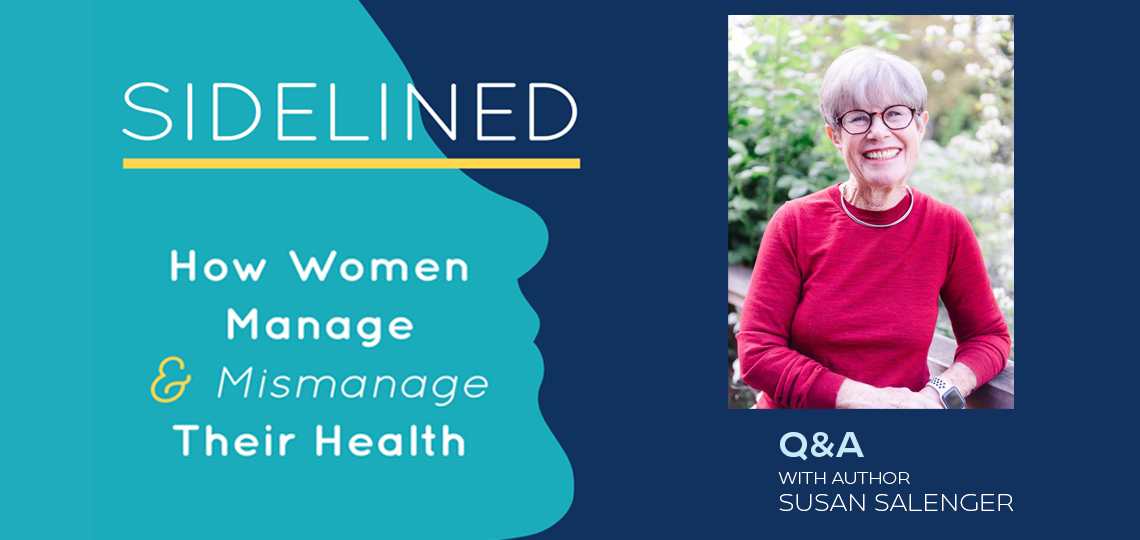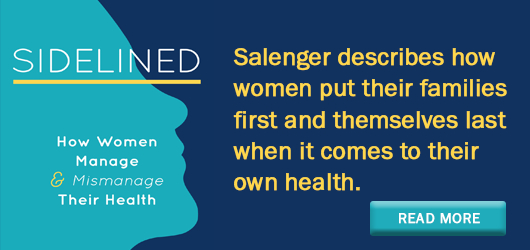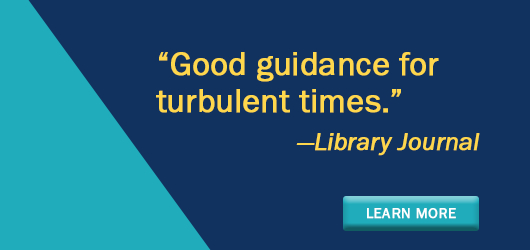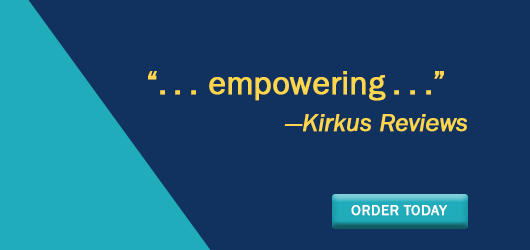Never again will you ask yourself, "Why did I agree to that?"

Managing Editor Danielle Ballantyne Interviews Susan Salenger, Author of Sidelined: How Women Manage & Mismanage Their Health
Women’s healthcare has always trailed behind that of their male counterparts. Women have historically been neglected from clinical trials, conditions that present more often in women have gone underresearched, and draconian laws have restricted women’s autonomy over and access to healthcare. The battle for equality in healthcare is not merely uphill; it can feel Sisyphean.
Inspired by her own experiences and experiences she has collected from women around her, Susan Salenger presents Sidelined: How Women Manage & Mismanage Their Health, a thoughtful, well-researched guide to aid women in navigating an inherently hostile healthcare system.
We sat down with Susan to discuss her book; we hope you find the interview as instructive and enlightening as we did.
Your book is full of some very surprising data, some of it even a little disheartening. I was struck by the prevalence of misdiagnoses and the elements that can contribute to them, particularly the gendered aspects—such as typical conversation styles—that make women more vulnerable to misdiagnosis. Can you talk a little bit about that and share any advice you’d want women to carry into the exam room with them?
Thanks so much for inviting me to speak more about my book Sidelined: How Women Manage & Mismanage Their Health.
My primary goal in writing the book is to help women become more aware of some of the hurdles we face in getting the most effective care when we become ill. Since women are misdiagnosed more often than men, one thing we all need to do is help ensure that our diagnoses and treatments are accurate.
I’m an avid reader, but what made the most impact was the reading I did about women and medicine in the anthropology classes I took at UCLA. I remember thinking this information needs to be out there for women to learn and use in their daily lives. This knowledge and an unfortunate medical experience I had over thirty years ago were the seeds for conducting additional research and writing my book.
To help understand why women are so vulnerable to misdiagnoses, it’s useful to examine some of the reasons:
First, the diagnosis itself is a tricky business. There are a minimum of 20,000 diseases out there, many of which share similar symptoms. The doctor needs to play detective to figure out which of all those diseases fit best with the symptoms patients describe. Sometimes that can be like looking for a needle in a haystack. And since women suffer from more autoimmune diseases than men do, a doctor’s task becomes even more difficult. Autoimmune symptoms can come and go, which makes them harder to pinpoint; their symptoms can mimic each other; and often there are no lab tests to aid in the diagnosis, which makes the diagnosis even more complex.
A second reason is that we know less about women’s bodies than we do about men’s. Women researchers receive less funding than male researchers, and their research is published less frequently. So if you’re a woman researching a woman’s disease, you may well find yourself at the bottom of the funding & publication barrel.
Third, for years women were omitted from clinical trials. While the situation has greatly improved, we’re still living with that unfortunate history.
Fourth, I believe that how some women describe their symptoms can lead doctors down a path toward a psychological diagnosis. When men describe their symptoms, they’re more objective and succinct than women are. They’re more technical and less emotive. Women, on the other hand, describe symptoms in a context. We often describe not only our physical symptoms but how we feel about them. We discuss how depressed we are, how we lack energy, how we’ve lost our appetite, all of which can lead doctors to focus on our emotional symptoms rather than our physical ones. And women do suffer more from depression and anxiety than men do. So receiving a diagnosis of stress or depression may well be accurate and doesn’t necessarily mean you’re gaslighted. I’m not saying that we shouldn’t tell our doctors how we feel. But I am suggesting that it might be more productive to think through how we say what we say. It’s essential to be thoughtful about how we present our symptoms to ensure that our doctors stay focused on the symptoms we’re most concerned about.
This leads me to the last part of your question: advice. I highly recommend going to your doctor visit with a written and prioritized agenda of what you wish to discuss. A written agenda will keep both you and your doctor on track. Toward the end of the visit, I suggest you repeat, in your own words, what you heard the doctor say. That gives you a chance to be sure you heard correctly and gives doctors an opportunity to confirm that they said what they meant to say and to correct any misunderstandings.
Don’t introduce a new problem at the end of the visit. That’s unfair to both you and your doctor. As the visit progresses, ask any and all questions that occur to you. Try to take someone with you to help listen and write down what’s said. That way, you can review your notes after the visit and call back, email, and follow up with whatever you don’t understand.
My book has an extensive resource directory to help women ask the right questions and conduct the right research. It’s been a lifesaver for those who don’t know where to start. I don’t want anyone not to feel prepared at their next appointment.
I was shocked to learn how common it is for people to lie to their doctor, though I can’t claim innocence either. As you discuss in your book, we minimize the impact of these seemingly white lies, but can you outline for us the real consequences of the tangled webs we weave?
You’ll be surprised at how many women omit information or lie to their doctors about their health habits: 52 percent. You’ll be even more surprised at how many women don’t think lying matters: 25 percent.
We try so hard to be good patients. We want our doctors to like us; we often tend to tell them what we think they want to hear. The problem, of course, is that by “stretching the truth,” we’re doing ourselves a huge disservice. If we’re not upfront about our health habits, our symptoms, or the medications we’re taking, we can cause ourselves a great deal of harm. We’re presenting an incomplete and distorted picture, which makes it difficult for doctors to arrive at an accurate diagnosis and treatment.
Not only that, but if we lie about how much we drink, for example, the doctor could prescribe a medication that interacts poorly with alcohol and becomes counterproductive. Or, if we fail to mention a medication or supplement we’re taking, we could be prescribed an additional medication that interacts with it. For example, patients who take certain herbal products or Celexa for depression should not take Lexapro, another common anti-depression and anxiety medication. Lying or omitting necessary information can result in misdiagnoses and inaccurate treatments! It’s an extremely dangerous path to take.
You include a variety of personal stories in your book about women tackling different conditions and challenges related to their health. I was struck by Deborah’s story in particular; I found her hesitancy toward getting a blood test to determine if she had a genetic predisposition to developing breast cancer to be very relatable. A lot of people would rather live in reasonable doubt than accept the consequences of certainty—in Deborah’s case, the anxiety of knowing she had a ticking time bomb strapped to her chest. Deborah got her good news in the end, but what advice do you have for people who are still choosing limbo?
I talked with Deborah, a woman very worried about her potentially high risk for breast cancer. She’s an Ashkenazi Jew, has never had children, and her grandmother had breast cancer in her early fifties. As a result, her doctor had urged her to have a BRCA blood test to determine whether she had a genetic predisposition to the disease.
Deborah was enmeshed in her career and, as a result, too busy and too frightened to get the test. As she said, “Because my risk is so high, my doctor told me I had several options if the test turned out positive and, frankly, they all sounded horrible. And even if I didn’t take any of them, I’d be waiting on pins and needles to see if the cancer ever developed. My anxiety would be through the roof.”
Deborah’s response is a common one. Many women prefer to remain ignorant rather than face what could be a serious diagnosis. So we may hesitate to visit the doctor, refuse the necessary tests, neglect to fill our prescriptions, and generally just wish the whole situation would disappear.
Those attitudes, however, while entirely understandable, do us a disservice. In fact, they could lead what might be a minor problem to become a major one. Plus, we leave ourselves open to any of the complications the original disease may trigger. In fact, when I talked with Deborah again, several years later, she told me she had decided to take the test, and luckily, it turned out negative. But she said, “I was wrong not to have the test immediately. My anxiety was through the roof anyway, and knowing the risks, one way or the other, would have helped me.” She went on to say, “If the test turned out negative, I could have stopped worrying. If it had turned out positive, at least I’d know for sure what I might be facing. I think it’s information that every woman needs to know.”
And that’s the bottom line: we all need to know what’s going on with our health. Sometimes, like Deborah, the news offers relief. Other times, not so much. But whatever the outcome, the information gives us a chance to be in charge of our own bodies, to do our own research, check out specialists just in case, and work with them to determine the best course of action. Ignorance is not bliss; it’s just ignorance. And that’s not helpful to anyone.
The thing that will stay with me the longest from your book is the information surrounding how many more medications women are being prescribed compared to men and the contributing causes to this, such as pharmaceutical ads being targeted to women. According to the data you present, women also frequently ask for and receive the medications in these ads when they have not been properly tested on women. When we’re talking about something as complex as overcoming the subliminal messages of advertising, how do you think women can best ensure they are getting the right amount of the right medications?
Think about this: more than half of all Americans take approximately four prescription medications every day, and women are prescribed more pills than men are. Women visit doctors more frequently, which often leads to more prescriptions. We suffer disproportionately from anxiety and depression, conditions which are often treated, at least in part, with drugs.
There’s no question that drugs can be helpful. But problems can ensue when they become our default strategy. When that happens, we may end up exposing ourselves to unnecessary and unwanted side effects. Sometimes, the cure can be worse than the disease.
Women make approximately 80 percent of all healthcare decisions. Pharmaceutical companies know this and target their ads accordingly. The United States and New Zealand are the only two countries in the world that allow drugs to be advertised to consumers. That’s partly because two thirds of adults take some kind of action after seeing a drug ad, and action translates into more money for the drug companies. 40 percent of us make an appointment with our doctor, and many of us believe the ads are completely truthful. So we ask our doctor to prescribe the drug we’ve seen advertised even though there may be a more effective one for our condition.
One of the hidden problems in this already unpleasant scenario is that many prescription guidelines are gender blind. That means women, more than likely, suffer more side effects than men because we’re often prescribed the same dosage of a medication. But women are smaller than men and metabolize drugs differently because we have a higher amount of body fat and more hormonal fluctuations. Women were omitted from clinical trials for so many years that doctors know less about how a particular medication may affect them.
So what can women do to get the right medication and the appropriate dosage? For one thing, we can become more discerning consumers. That means taking what you see or hear from drug ads with a BIG grain of salt. They are not always accurate! Be sure you tell your doctor about ALL the medications, supplements, ointments, liquids, etc. that you take. You need to be sure there are no interactions.
Do your own research: what is the average dosage that patients are prescribed; what are the side effects; is it the proper medication appropriate for your symptoms? And, most important, what are the instructions for taking them? Are they more effective if you take them with food? At night? How much time should you take them for? And then ask the doctor if the dosage is right for you. I’m particularly small and, after talking with my doctor, frequently take half the dosage prescribed to me. Medications can be problematic for women. Before you take them, be sure to find out everything you can.
Remember, it’s your body, and you need to be sure you take the very best care of it. As I mentioned above, my book has an extensive resource directory to help women ask the right questions and conduct the right research.
If any of your readers have further questions, I’d be happy to answer them. I can be contacted through my website at Susansalenger.com or via social media.
Danielle Ballantyne



